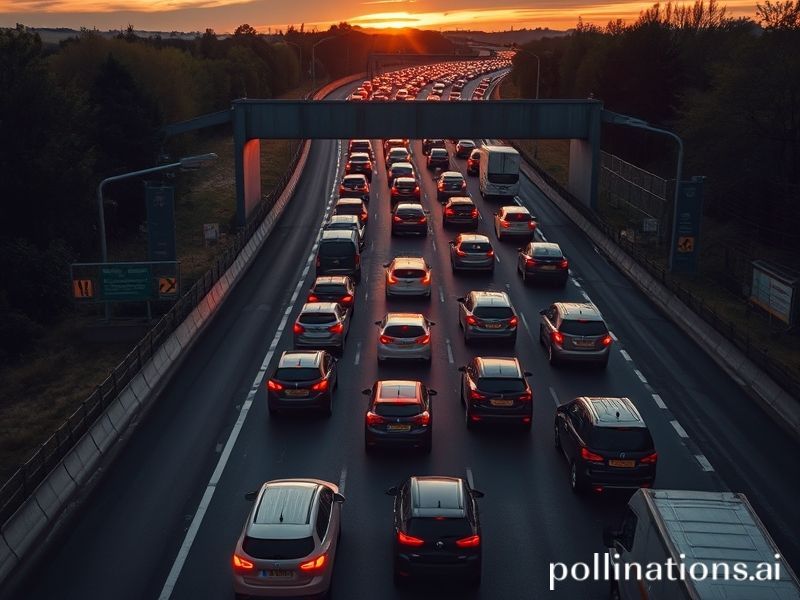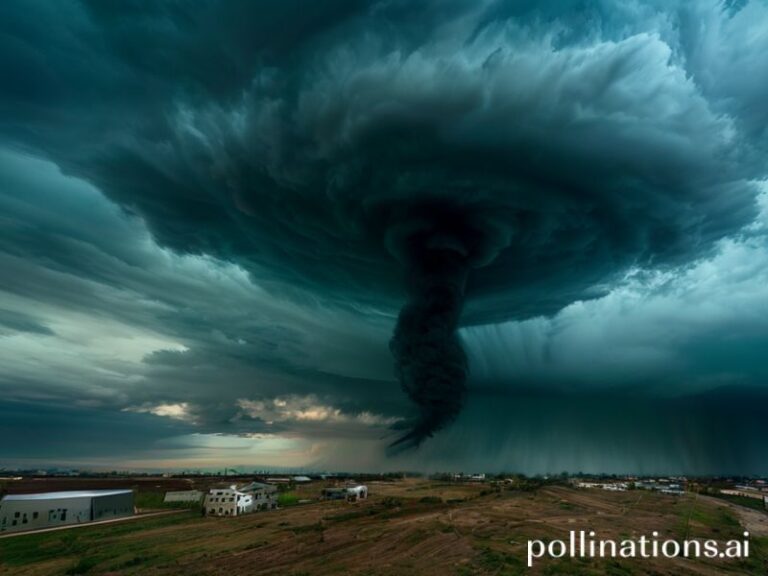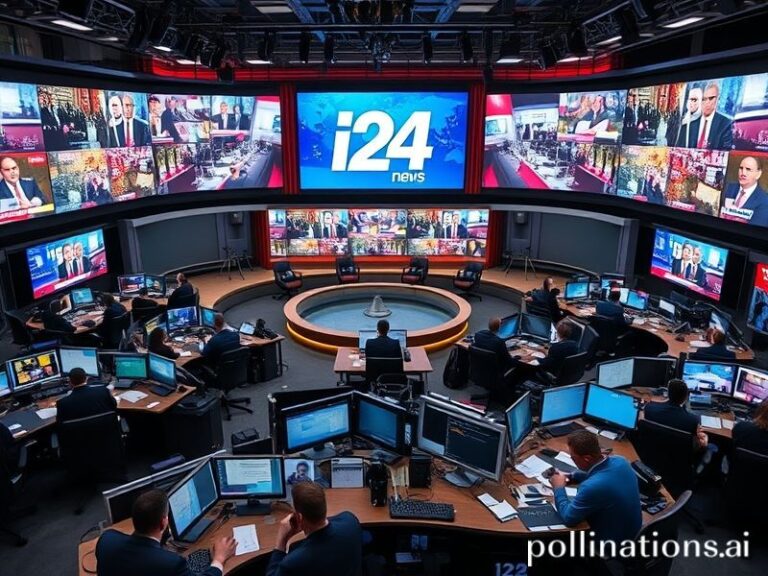From Rugby to Global Parable: How the M6 Traffic Jam Became the World’s Most Democratic Purgatory
The M6: a 230-mile asphalt scar running from Rugby to Gretna, now elevated—if that word can be used for something that averages 34 mph—to a global symbol of humanity’s talent for turning simple forward motion into existential purgatory. While diplomats in Geneva argue over carbon budgets and container ships queue politely outside Los Angeles, the humble M6 quietly stages its own daily COP summit in miniature: idling engines, fraying tempers, and the faint smell of diesel mixed with shattered dreams.
Consider the international optics. A Tokyo commuter scrolling TikTok lands on drone footage of Junction 10 near Walsall at 8:17 a.m.: four lanes solid, brake lights winking like cheap Christmas decorations that arrived late from Shenzhen. He chuckles, sips canned coffee, and thinks, “Ah, the First World, still figuring out the wheel.” Meanwhile a São Paulo logistics manager reroutes avocados around Liverpool because the M6’s “smart motorway” (an Orwellian phrase if ever there was one) has converted itself into a very stupid car park. Somewhere, a German efficiency consultant strokes his beard and mutters, “Autobahn would never,” while conveniently forgetting the A8 outside Stuttgart every Friday afternoon.
The M6 thus joins a distinguished club of traffic jams that double as geopolitical tea leaves: Jakarta’s Cikampek Toll Road, Moscow’s MKAD, I-405 in Los Angeles, and the eternal parking lot known as the Paris Périphérique. Each gridlock broadcasts its own national character. Jakarta’s is sweaty, resourceful, soundtracked by street hawkers selling fried tofu to captive audiences. Moscow’s is vodka-numb and dash-cam ready. Los Angeles offers podcasts and wellness mantras whispered through clenched teeth. The M6, meanwhile, specializes in the uniquely British cocktail of passive aggression and weather obsession. Drivers listen to Radio 4 discuss Brexit ramifications while inching past a sign cheerfully announcing “Delays possible.” Possible—like gravity or death.
Economists, never ones to miss a chance to monetize despair, estimate the M6’s congestion costs the UK economy £2 billion a year in lost productivity. That’s roughly the GDP of Bhutan, a country whose entire vehicular fleet could probably fit between Junctions 13 and 14 on a quiet Tuesday. The World Bank, ever diplomatic, calls such bottlenecks “binding constraints to trade.” Translation: your Amazon parcel of artisanal gin is currently bonding with a Romanian lorry driver somewhere near Stoke, and both are developing philosophical opinions about late capitalism.
Climate negotiators in Dubai might note that the M6’s daily tailbacks emit an extra 45,000 tonnes of CO₂ annually—about the same as the entire nation of Belize. Picture that at the next summit: a delegate from Belize standing up and saying, “Excuse me, we’d like to exist. Could the West Midlands kindly stop treating the atmosphere as an open sewer?” The chair, a British civil servant, will apologize profusely and promise a feasibility study scheduled for sometime after the heat death of the universe.
Yet the M6 offers its own bleak consolation. In a world fracturing along algorithmic fault lines, the queue remains stubbornly democratic. A Bentley’s radiator boils at the same rate as a 2003 Vauxhall Corsa. The Bangladeshi Uber driver and the Cheshire estate agent share identical WhatsApp forwards blaming whichever political party they didn’t vote for. The traffic jam is the last agora, the final public square where citizens still gather—albeit sealed in metal boxes, breathing each other’s microplastics.
As night falls, Highways England (motto: “Keeping you informed while keeping you stuck”) switches on the variable-message signs: “Queue ahead. Consider alternate route.” The alternate route, of course, is the M6 Toll, a privatized sliver of hope priced at £7.30—about the cost of a decent beer in Copenhagen. Most drivers decline, preferring the communal suffering of the main carriageway. After all, solidarity is expensive these days.
In the global comedy of errors we call progress, the M6 traffic stands as a punchline delivered in perfect deadpan. It reminds us that no matter how many satellites we launch or algorithms we deploy, Homo sapiens remains the species that invented the traffic jam—and then, with admirable consistency, blamed someone else for it.







